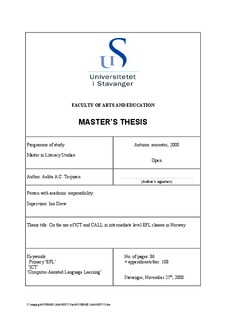On the use of ICT and CALL in intermediate level EFL classes in Norway
Master thesis
Permanent lenke
http://hdl.handle.net/11250/185322Utgivelsesdato
2008Metadata
Vis full innførselSamlinger
- Student papers (HF-IKS) [909]
Sammendrag
This thesis investigates the advantages and challenges facing teachers in the process of
applying ICT (Information and Computer Technologies) and especially CALL (Computer-
Assisted Language Learning) in EFL (English as a foreign language) teaching in Norwegian
primary schools at the intermediate level (grades 5 to 7). The aim of the study was to explore
the extent and the manner ICT and CALL were promoted on the basis of the guidelines in the
national curriculum L97 for English. The research was primarily quantitative, based on data
gathered from an electronic questionnaire survey among teachers throughout Norway. In
addition, two interviews with teachers using ICT frequently in their lessons supplied the study
with a qualitative dimension.
The study describes the situation of CALL in Norwegian primary schools and
additionally discusses the possibilities of improving the state of CALL and ICT in general in
the process of EFL education in relation to the L97 curriculum. The study analyses the results
of the survey and interviews in the context of theoretical background about the nature and
history of CALL. It includes a review of some research studies relevant to the topic of the
thesis.
The original assumption in the study was that ICT was an excellent learning tool that
could be used to assist teachers and pupils to acquire new knowledge and skills in EFL. The
background was the emphasis on computer literacy in EFL in the L97 national curriculum. It
was considered important to find out about teachers' proficiency in using ICT and CALL,
what ICT technology was used, and what the benefits of it were for the pupils. However, the
results of the study suggest that the ICT situation in EFL does not reflect the intentions of the
curriculum. The findings induce great concern, especially regarding primary teachers' formal
training, both in English and ICT.
A discrepancy was found between theory and practice in the implementation of CALL
in EFL at the intermediate level. On the one hand, the curriculum explicitly suggested a
transformation in the EFL learning environment by introducing computer-mediated language
learning as part of the national curriculum in English. On the other hand, neither schools nor
teachers appeared to be fully prepared for the transition to a digitalised EFL learning
environment.
At the same time, some positive effects of the application of ICT technologies in
English lessons were registered, especially pupils' motivation and interest.
Beskrivelse
Master's thesis in Literacy studies
